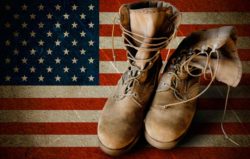 IEDs and EFPs are weapons that have killed and injured many US troops in the Afghanistan and Iraq wars. Though IEDs were at first one of the most common explosive weapons faced by American troops, EFPs posed a particular danger to troops.
IEDs and EFPs are weapons that have killed and injured many US troops in the Afghanistan and Iraq wars. Though IEDs were at first one of the most common explosive weapons faced by American troops, EFPs posed a particular danger to troops.
Now, a lawsuit challenges the origins of these EFP weapons, taking foreign banks to task for allegedly funding Iran’s unlawful production of weapons like EFPs and sponsoring terrorism. Other lawsuits have been filed against Iran itself over the issue, aiming to gain compensation for victims and curb the practice of institutions profiting from the loss of American troops’ lives.
About the IED EFP Lawsuits
Families and injured troops claim that US troops were injured by these weapons that were funded by foreign banks and represented Iran’s involvement in the wars.
According to Military Times, a number of lawsuits are now being filed over the issue, attempting to hold both the Islamic Republic of Iran and a number of foreign banks accountable for the injuries suffered by American troops who experienced IED and EFP blasts.
According to one family member of a soldier killed by an explosive weapon, as quoted by Reuters, “I never suspected these big banks would turn a blind eye” to how they were making money at the expense of American soldiers’ lives, and in violation of sanctions against Iran.
Of the lawsuit, the family member said that “even if the case doesn’t get that far, at least the story [of the banks’ involvement] is told. It needs to be exposed,” per Reuters’ report. Reuters also notes that other experts and family members accused the banks of being “deliberately indifferent” to how the transactions from Iran were being used or how they were making money.
Together, a small New Jersey law firm and an Arkansas lawyer are taking on the Islamic Republic of Iran, arguing that the country violated sanctions preventing them from sponsoring terrorism. The lawyers claim that the country provided weapons, materials, training and other support for terrorists like Shi’a extremists in the Iraq and Afghanistan wars.
Iran may not have been alone in its efforts to support terrorism, however. Allegedly, many foreign banks contributed funds and worked with Iran to help it get around American sanctions. Allegedly, these banks did this in their own interest as well, gaining large profits in the process.
Some banks have already pled guilty to their support of terrorism in the Iraq and Afghanistan Wars, and have reached settlements with the United States over this size. These banks include HSBC of UK, BNP Paribas of France, and Germany’s Commerzbank.
What are IEDs and EFPs?
IEDs and EFPs are both kinds of explosive devices used in the Iraq and Afghanistan wars. IEDs are Improvised Explosive Devices. They are often uses in roadside bombs, and tragically, IED deaths in Iraq made up 63 percent of coalition deaths from the beginning of the Iraq War through 2007. In the Afghanistan War, they were responsible for 66 percent of the deaths between 2001 and the present.
EFPs, or explosively formed penetrators, are also explosive devices, but are piercing weapons that can go through armor. They are often camouflaged and hidden far from a road, and can travel over 100 yards. The New York Times called these weapons “the most lethal weapon American forces faced in Iraq.”
Tragically, both of these kind of devices can cause a range of devastating injuries, and are very lethal.
Though IEDs were a common weapon in the Iraq and Afghanistan wars, reportedly, the weapons made in Iranian factories were largely EFPs. Military Times said the EFPs “required more sophisticated engineering knowledge than what was being seen in the often deadly, but less effective, homemade improvised explosive devices that littered the landscape after the 2003 invasion of Iraq.”
How can a lawsuit hold Iran accountable for EFPs used in Iran?
Reportedly, these weapons were being made in mass quantities in Iran. Now, families whose loved ones were killed or injured by these weapons in the Iraq and Afghanistan wars are filling a lawsuit against Iran in an attempt “to lay out in detail how Iran developed its network of proxies in Iraq and used it to carry out terror attacks exclusively intended to target Americans and our coalition partners.”
Military.com says that according to chairman of the Joint Chiefs of Staff, Marine General Joseph Dunford “did not dispute the assertion of Senator Tom Cotton, R-Arkansas, that as many as 500 U.S. troops had been killed by Iranian-supplied EFPs in Iraq.”
General Dunford says that “we weren’t always able to attribute the cases to Iranian activity, though many times we suspected it was Iranian activity though we didn’t necessarily have the forensics to support that.”
What are the challenges in the cases involving EFP, IED deaths in Iraq and Afghanistan?
Military.com goes on to say that Iran does not honor the court’s jurisdiction in the IED EFP involvement lawsuit, and is not represented by a defense team for it. The lawsuit seeks $10 billion in damages for families and service members affected by the IED and EFP weapons, but family may not receive the desired compensation.
This is because allegedly, enforcing and collecting on a judgement against state-sponsored terrorism is harder than getting a judgement in the first place.
In the case of the lawsuit filed against banks, the Iranian terrorism involvement class action lawsuit was filed under the Anti-Terrorism Act. It is the first one in which soldiers seeks damages against international banks, and is the first one make a conspiracy claim, which may pose a problem when establishing whether or not one can bring such a claim forward under the Anti-Terrorism Act.
Additionally, there is just the complexity of the banks’ and Iran’s involvement in the wars in the first place. Lawyers are attempting to attack “large-scale financial institutions for their involvement in moving money from Iran through U.S. banks, which they alleged was then funneled to Iranian proxies who carried out attacks,” says MilitaryTimes.
There are many parties who played a range of roles in this issue, which could possibly make litigation complex. MilitaryTimes goes on to say that the lawsuit argues that HSBC, Standard Chartered Bank, Barclays, Commerzbank, Credit Suisse, Bank Saderat, and Royal Bank of Scotland, NV “conspired with Iran and its banks to illegally transfer billions of dollars through US banks, circumventing regulators and law enforcement detection of the transactions.”
How did the money from foreign banks get from Iran to Iraq?
Reportedly, this transfer of funds was effectively money laundering. Attorneys argue that the hundreds of millions of dollars were transferred to the Islamic Revolutionary Guard Corps-Quds Force. This organization is a military wing that conducts operations outside of Iran. The New York Times describes this argument as attorneys tracing an elaborate, indirect, though perhaps powerful, connection between the parties.
How do experts know that weapons used against American troops were made in Iran?
Much of unraveling the connections between the foreign banks, Iran, the Iranian and Iraq wars, was done by looking at the wreckage made after an EFP exposed.
Reportedly, the evidence that could be collected after an EFP attack indicated that the weapons involved were created in Iran. MilitaryTimes says that characteristics like “how the EFP punches through armor, the traces of copper and different explosives and the shape of the hole” tell experts “what kind of bomb wreaked havoc in a particular attack,” and possibly, where that bomb was made.
Beyond the physical attributes of the bomb, techniques used to turn on the bombs suggested that the people who planted the bomb were instructed by trainers from either Iran or Hezbollah — a Shi’a Islamist political party and militant group based in Lebanon.
Is foreign funding of terrorism common?
Unfortunately, the issue of terrorism being funded or supported by institutions around the world is not unique to the Iraq and Afghanistan Wars. According the the Council on Foreign Relations, around the world, terrorism is funded from a range of sources, including donations from wealthy individuals, front companies, illegal activities, and even charities.
In some cases, donations from legitimate causes can be co-opted and used to fund terrorist activity either directly or indirectly.
Indirect funding of terrorism can be hard to pinpoint, as was largely the case in the foreign banks’ involvement in the Iraq and Afghanistan Wars via Iran and its weapons used against American troops.
Can victims of state-sponsored terrorism and their families receive compensation?
Filing a lawsuit over the issue is one way to possibly receive IED compensation, and to stand up to the practice of foreign banks funding terrorism and profiting from the deaths of American soldiers. However, there is risk involved, and not every lawsuit is successful.
Some state-sponsored terrorism lawsuits have already been successful, and people who were affected by state-sponsored terrorism have been awarded compensation for their injuries.
There is a U.S. Victims of State-Sponsored Terrorism Fund, that is designed to provide compensation to families and individuals injured by state sponsored terrorism. This fund has reportedly paid $1.1 billion to people affected by state-sponsored terrorism. MilitaryTimes notes that the fund anticipates to distribute the same amount to victims next year.
Have the banks involved faced repercussions for their sponsorship of state terrorism?
Some banks have already admitted to their involvement in the Iraq and Afghanistan, and have agreed to forfeit their profits from their involvement.
In many cases, the banks have entered into “deferred prosecution agreements” and have agreed to pay the U.S. government fines and have agreed to forfeit the profits made from their involvement. By taking the deferred prosecution agreements, these banks avoid further prosecution and further penalties.
If you or a loved one was injured or killed by an IED or EFP while fighting in the Iraq or Afghanistan wars, legal recourse is available. Get help now by filling out the form on this page for a FREE case evaluation.
The attorneys who work with Top Class Actions will contact you if you qualify to let you know if an individual lawsuit or anti-terrorist class action lawsuit is best for you. (In general, anti-terrorist lawsuits are filed individually by each plaintiff and are not class actions.) After you fill out the form, the attorneys who work with Top Class Actions will contact you if you qualify to let you know if an individual lawsuit or class action lawsuit is best for you. Hurry — statutes of limitations may apply.
ATTORNEY ADVERTISING
Top Class Actions is a Proud Member of the American Bar Association
LEGAL INFORMATION IS NOT LEGAL ADVICE
Top Class Actions Legal Statement
©2008 – 2026 Top Class Actions® LLC
Various Trademarks held by their respective owners
This website is not intended for viewing or usage by European Union citizens.
Get Help – It’s Free
Join a Free Iranian IED, EFP Lawsuit Investigation
If you qualify, an attorney will contact you to discuss the details of your potential case at no charge to you.
PLEASE NOTE: If you want to participate in this investigation, it is imperative that you reply to the law firm if they call or email you. Failing to do so may result in you not getting signed up as a client or getting you dropped as a client.
Email any problems with this form to [email protected].
Oops! We could not locate your form.












